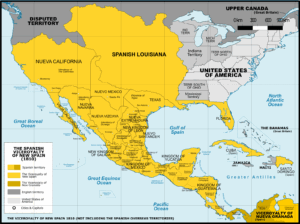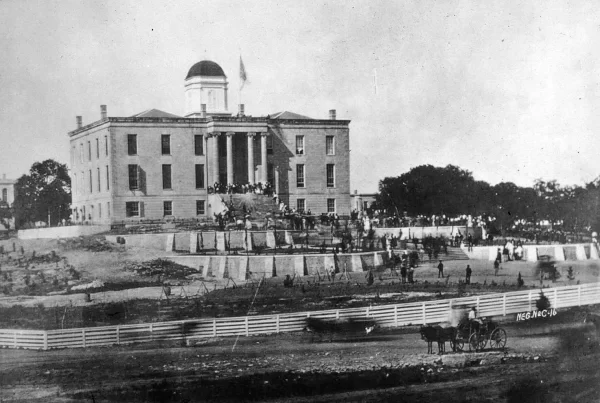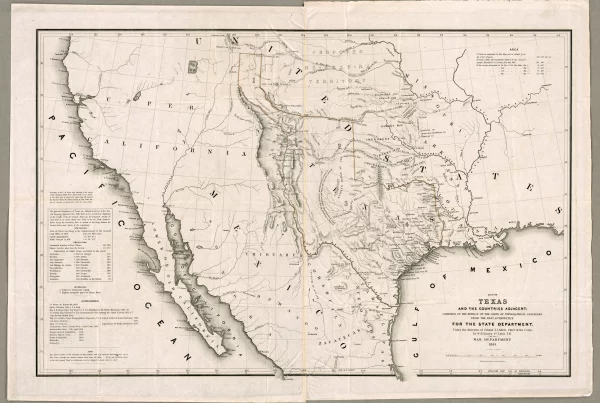Historical Context
When Stephen F. Austin founded his colony in eastern Texas in 1821, he did so as a citizen of Mexico, which had only just declared its independence from Spain.
Through the first decade and a half of the colony’s existence, Austin’s colony—the first Anglo-American settlement in Texas—absorbed Spanish/Mexican legal influences, even as settlers brought with them from the east their own Anglo-American legal heritage.
Farther south in Texas, especially in San Antonio, the influence of Spanish (Castilian) law went back another century, dating to the founding of San Antonio as a Spanish mission in 1718.

The Texas Revolution of 1835 and Texas’s subsequent annexation by the United States meant a decisive turn toward Anglo-American law. The vast majority of American-born settlers wanted an American system of laws, and they were unfamiliar with Spanish and Mexican law codes and court practices—or even overtly hostile to them.
Despite this, a number of early Texan judges, lawyers, and legislators took an interest in Spanish and Mexican law and made conscious efforts to harmonize and adopt from it, smoothing the transition from Spanish civil codes to the new system.
Austin himself played a significant role in this process, honoring and borrowing from the Mexican system, learning the Spanish language, and administering justice in his colony according to a hybrid system. John Hemphill, the chief justice of Republic of Texas judiciary, was another influential figure in the transition.

Today, Texas retains vestiges of Spanish legal influence, which in turn have also influenced law throughout the United States.
“Given the rather disdainful view of Hispanics and Mexicans held by many Anglo-Saxons in the nineteenth century, it is perhaps surprising that so many Spanish legal practices survived to become a permanent part of the states’s body of law,” writes Donald Chipman, a historian who specialized in the Spanish period of Texas history.1 “Those influences… fall into three broad categories: rules of judicial procedure, land and water law, and family law.”
Spanish Influence on Family Law
“Family law in Texas is especially steeped in Spanish elements,” Chipman says. This influence included inheritance matters, marriage, and adoption.
Adoption was an accepted part of the Spanish civil law tradition, whereas it was unknown in the Anglo-American legal tradition until the 19th century, and not widely embraced until the 20th century (England itself didn’t pass its first adoption law until 1926).
Apart from Mississippi, Texas was the first U.S. state to legally recognize adoption, passing an adoption law in 1850. Legal scholars generally attribute this decision to the Spanish colonial influence.
Spanish law also influenced Texas’ law of matrimonial property. Husband and wife generally share all property in Texas, a system called “community property.” Eight other U.S. states use this system, including California, Arizona, New Mexico, which were likewise part of New Spain.
Writing in the Handbook of Texas, a publication of the Texas State Historical Association, Joseph McKnight stated, “The Anglo-American frontiersman found the idea of common ownership of the gains of marriage between husband and wife much more agreeable to his society than common-law principles.”
Probate law in Texas also draws on the Spanish tradition, providing for a simpler system than the English one. It is common in Texas probate cases to appoint an independent executor, which is a position modeled on the Spanish albacea universal.
Spanish Influence in Civil Procedure
Some legal scholars also argue that Spanish/Mexican law influenced civil procedure in Texas. Specifically, the Texas Republic adopted a simplified petition-and-answer system of pleading, soon after it won its independence from Mexico.
Texas also eliminated the English distinction between equity and common law jurisprudence—a change that eventually spread throughout the United States. Texas was the first jurisdiction in the English-speaking world to adopt the unitary system.
Attorney/historian James. W. Paulsen explains how this decision came about: “Spain and Mexico were civil law jurisdictions, so the English distinction between law and equity was unknown. Pleadings also were simple—petitions and answers. A fair number of Anglo settlers had acquired some experience with, and appreciation for, Mexican courtroom procedures before the [1836] Revolution,” he wrote in a 2011 article in the Houston Lawyer.
“So, just two weeks after the Republic adopted the common law, lawmakers provided that ‘the proceedings in all civil suits shall, as heretofore, be conducted by petition and answer,’ and that legal and equitable claims could be raised and decided in a single lawsuit.”

Lastly, another element of Spanish procedural law that has survived in Texas today is the rule that a person must be sued where he or she lives, rather than where the dispute arose.
‘Alcaldes’ and County Judges
Spanish law also may have influenced the structure of local government in Texas. Texas counties are headed by “county judges” that wield both executive and judicial powers. Their dual executive-judicial role is, arguably, derived from a comparable position in Spanish colonial government.
In New Spain, the alcalde was a regional magistrate who represented of the crown and exercised both administrative and judicial functions. His title came from an Arabic root word, al-qadi, which means “judge,” reflecting Arab influences in Spain.
Texas is unusual among U.S. states in referring to its county executives as “judges.” The only other state to do so is Arkansas. (Confusingly, there is another type of “county judge” in Texas too, which is purely a judicial official, who holds overlapping jurisdiction with the county executive/judge. However, this position was created later).
- Donald E. Chipman, Spanish Texas: 1519–1821 (Austin: University of Texas Press, 1992), pg. 250. ↩︎
Related Books
Dive deeper into this topic by purchasing any of these recommended books. As an Amazon Associate, Texapedia earns a commission from qualifying purchases. Earnings are used to support the ongoing work of maintaining and growing this encyclopedia.



